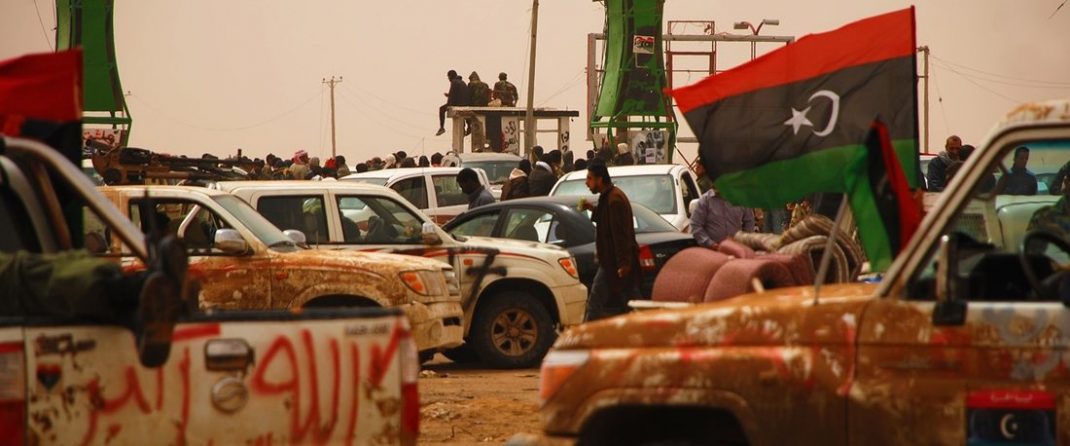By Chris Stephen
 Instability continues to derail oil authorities’ attempts to persuade IOCs to return.
Instability continues to derail oil authorities’ attempts to persuade IOCs to return.
Libya’s much-heralded oil exploration venture involving BP and Italy’s Eni has been delayed, the latest casualty of a worsening civil war and erratic behaviour by the country’s rival governments.
The venture was announced in October last year and was predicted to kick-start exploration which had halted earlier this decade; but 12 months on, the two companies have shelved plans to deploy rigs.
Libya’s National Oil Corporation (NOC) is also facing trouble from both the country’s warring governments, with its chairman Mustafa Sanallah warning that the company faces possible break-up.
When the BP-Eni deal was announced, it was heralded as a return to exploration for international oil companies (IOCs), which have shied away from Libya since the start of civil war in 2014.
The project is centred on three giant exploration blocks, two in the western Ghadames Basin and the third in the Gulf of Sirte. BP bought the sites in 2007 but pulled out of Libya, citing security concerns, in 2013.
The new deal would see Eni acquire half of BP’s 85pc stake, with the balance held by Libya’s sovereign wealth fund, the Libyan Investment Authority.
Both companies were initially enthusiastic, with BP chief executive Bob Dudley predicting last October that work would begin early this year. “It takes time to set up offshore rigs, but Q1 (2019) for sure,” Dudley said.
But a year on, work has yet to start. BP has no mention of Libya on its website, and an Eni spokesman said it had no updates on when work might start, pending its Q3 results announcement at the end of this week.
Both companies have good reason to hold back: the Ghadames Basin is the scene of fighting between forces of rival governments, in Tripoli and Tobruk, overlaid by a US air-strikes campaign against the Islamic State group.
Meanwhile, the Gulf of Sirte, rumoured to hold substantial reserves of oil and gas, would involve huge investment in what remains a chaotic country.
Erratic governance
In Libya itself, the NOC is complaining that both warring governments are impeding its operations.
In early October, prime minister of the eastern-based government in Tobruk, Abdullah al-Thinni, complained that Tripoli was starving it of funds, and demanded a larger share of the country’s oil revenues, currently about $2bn a month.
The complaint is an old one: eastern Libya is home to the Sirte Basin, accounting for two-thirds of national production, but oil revenues are collected by Tobruk’s rival, the Government of National Accord (GNA) in Tripoli, because it is the internationally recognised seat of authority.
It is a curiosity of the war that, even as Tripoli and Tobruk fight each other, Tripoli sends a portion of Libya’s oil income to Tobruk, including salary payments for the Libyan National Army, led by Khalifa Haftar, which has been besieging the capital since April.
The NOC is trying to stay above the fray, insisting it is independent; but the pressures of war are starting to tell.
Tripoli accuses Tobruk of using deliveries of aviation fuel to enable its air force to make daily strikes on the capital. Tobruk in turn complains that fuel deliveries from Tripoli have been cut and, in September, seized control of the NOC’s fuel delivering subsidiary, Brega Petroleum Marketing Company, based in eastern Libya.
Sanallah has accused Tobruk of trying to sell oil independently of the NOC, in defiance of several UN Security Council resolutions mandating that the NOC is Libya’s only legitimate oil marketer. He has also clashed with Tripoli’s GNA, accusing it of starving the NOC of investment funds and warning oil production will suffer.
The GNA is causing problems on another front: in May, it abruptly suspended the operation licences of Total and 39 other foreign companies, apparently after EU leaders failed to back the GNA in its battle with Haftar’s forces.
Later the same day, the GNA backtracked, giving the companies until August to submit fresh licence applications. GNA economy minister Ali Abdulaziz Issawi warned IOCs that if new licences were not approved, “there are several oil companies to take [over] the oil fields in 24 hours”.
August came and went, with no further announcements, and Total and the other companies continued to operate. But the episode has done nothing to bolster IOC confidence that Libya is a safe place to invest.
NOC break-up speculation
This month Sanallah visited Washington and Houston, hoping to encourage US firms to invest in a programme to push oil production from the current 1.1mn bl/d to 2.4mn bl/d by 2024. So far, there are no takers.
In a gloomy speech delivered in Washington, he warned that the NOC may face “partition” between the rival governments, with such a split wrecking Libya’s economy. “The country would grind to a halt if these key functions are impeded,” he warned.
Meanwhile, the NOC’s authority is being eroded from within. Lacking refinery capacity, Libya imports two-thirds of its refined fuel, mostly from Italy, and a study by London thinktank Chatham House found much of that is stolen by western Libya’s all-powerful militias, either to be sold on the black market or exported back to Italy.
Germany is hosting a Libya peace conference in November in an attempt to halt the Tripoli fighting. But, with Haftar determined to capture the city, while GNA militias hold him to a stalemate in the outer suburbs, few expect a breakthrough.
_____________





